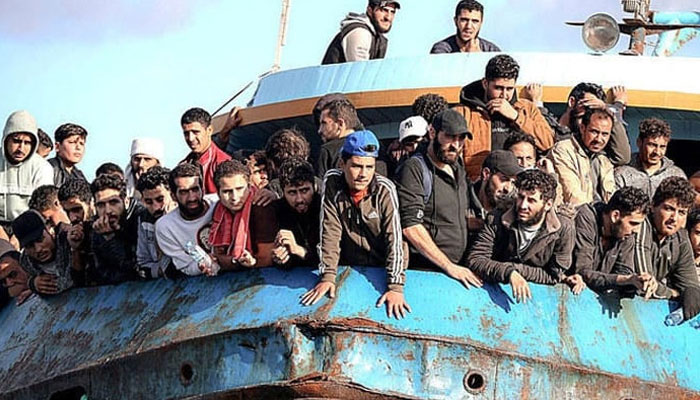Trafficking challenge
Boat disaster last month, serves as grim reminder of perilous journeys many undertake in search of better futures
Human trafficking remains one of Pakistan’s most persistent tragedies, preying on the desperation of vulnerable individuals. The boat disaster off Greece’s coast last month, which claimed the lives of five Pakistani nationals, serves as a grim reminder of the perilous journeys many undertake in search of better futures. While the government, led by Prime Minister Shehbaz Sharif, has signalled a commitment to tackling this scourge, the true challenge lies in translating promises into sustained, long-term action. Human trafficking thrives on the desperation of young individuals from poor and middle-class backgrounds. Lured by promises of lucrative employment abroad, families often sell their land and livestock, paying traffickers between Rs4 million and Rs6 million. Instead of opportunity, many find death at sea or imprisonment in foreign lands. Rising unemployment and inflation exacerbate this desperation, fueling the networks of traffickers who operate with impunity, often aided by corrupt officials within government institutions.
Prime Minister Sharif’s recent directives to seize traffickers’ properties, intensify legal actions, and emphasise stricter prosecution are steps in the right direction. The focus on enhanced airport screenings, public awareness campaigns, and encouraging legal channels for overseas employment reflects a multi-pronged approach. However, these measures must extend beyond announcements. Arresting facilitators and rooting out enablers within government offices is essential for long-lasting impact. The tragedy in Greece is far from an isolated incident. In recent years, hundreds of Pakistani migrants have perished while attempting dangerous crossings to Europe. Who can forget the 2023 boat disaster near Greece that claimed the lives of hundreds of Pakistanis? And, while cracking down on traffickers is crucial, it is equally important to address the root causes driving people to risk their lives.
The lack of job opportunities, coupled with rising inflation, forces skilled and educated individuals to seek livelihoods abroad. To stem this tide, the government must prioritise job creation, economic stability, and the promotion of technical training institutes. Coordination with foreign authorities is also vital to ensure the swift extradition and prosecution of traffickers operating beyond Pakistan’s borders. The Ministry of Information and Broadcasting should amplify awareness campaigns that highlight the risks of illegal immigration while promoting safer, legal alternatives. A cultural shift is necessary to dissuade citizens from viewing illegal routes as a viable solution for a better future. The fight against human trafficking requires more than crackdowns; it demands systemic reform and a holistic approach to protecting the vulnerable. Globally, the situation is rather dire. According to the UN Office on Drugs and Crime’s Global Report on Trafficking in Persons, human trafficking surged in 2022 due to ongoing conflicts, climate-induced catastrophes, and global crises. The report shows a 25 per cent increase in detected victims compared to pre-pandemic levels in 2019, with children accounting for 38 per cent of victims – a rise from 35 per cent in 2020. Considering the bloody conflicts of late 2023 and 2024, the next report will undoubtedly paint an even bleaker picture. It is shameful that the international community lacks urgency in addressing this crisis. Tackling human trafficking requires addressing its root causes: economic despair, lack of education, and systemic corruption. Without this, the cycle of exploitation will continue.
-
 Bad Bunny Faces Major Rumour About Personal Life Ahead Of Super Bowl Performance
Bad Bunny Faces Major Rumour About Personal Life Ahead Of Super Bowl Performance -
 Sarah Ferguson’s Links To Jeffrey Epstein Get More Entangled As Expert Talks Of A Testimony Call
Sarah Ferguson’s Links To Jeffrey Epstein Get More Entangled As Expert Talks Of A Testimony Call -
 France Opens Probe Against Former Minister Lang After Epstein File Dump
France Opens Probe Against Former Minister Lang After Epstein File Dump -
 Last Part Of Lil Jon Statement On Son's Death Melts Hearts, Police Suggest Mental Health Issues
Last Part Of Lil Jon Statement On Son's Death Melts Hearts, Police Suggest Mental Health Issues -
 Leonardo DiCaprio's Girlfriend Vittoria Ceretti Given 'greatest Honor Of Her Life'
Leonardo DiCaprio's Girlfriend Vittoria Ceretti Given 'greatest Honor Of Her Life' -
 Beatrice, Eugenie’s Reaction Comes Out After Epstein Files Expose Their Personal Lives Even More
Beatrice, Eugenie’s Reaction Comes Out After Epstein Files Expose Their Personal Lives Even More -
 Will Smith Couldn't Make This Dog Part Of His Family: Here's Why
Will Smith Couldn't Make This Dog Part Of His Family: Here's Why -
 Kylie Jenner In Full Nesting Mode With Timothee Chalamet: ‘Pregnancy No Surprise Now’
Kylie Jenner In Full Nesting Mode With Timothee Chalamet: ‘Pregnancy No Surprise Now’ -
 Laura Dern Reflects On Being Rejected Due To Something She Can't Help
Laura Dern Reflects On Being Rejected Due To Something She Can't Help -
 HBO Axed Naomi Watts's 'Game Of Thrones' Sequel For This Reason
HBO Axed Naomi Watts's 'Game Of Thrones' Sequel For This Reason -
 King Charles' Sandringham Estate Gets 'public Safety Message' After Andrew Move
King Charles' Sandringham Estate Gets 'public Safety Message' After Andrew Move -
 Lewis Capaldi Sends Taylor Swift Sweet Message After 'Opalite' Video Role
Lewis Capaldi Sends Taylor Swift Sweet Message After 'Opalite' Video Role -
 Brooklyn Beckham Plunges Victoria, David Beckham Into Marital Woes: ‘They’re Exhausted As It Seeps Into Marriage
Brooklyn Beckham Plunges Victoria, David Beckham Into Marital Woes: ‘They’re Exhausted As It Seeps Into Marriage -
 Sarah Ferguson Joins Andrew In ‘forcing’ Their Daughters Hand: ‘She Can Lose Everything’
Sarah Ferguson Joins Andrew In ‘forcing’ Their Daughters Hand: ‘She Can Lose Everything’ -
 'Bridgerton' Author Reveals If Actors Will Be Recast In Future Seasons
'Bridgerton' Author Reveals If Actors Will Be Recast In Future Seasons -
 50 Cent Super Bowl Ad Goes Viral
50 Cent Super Bowl Ad Goes Viral




